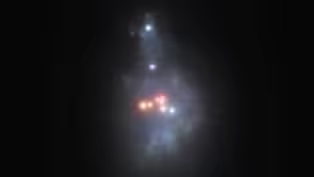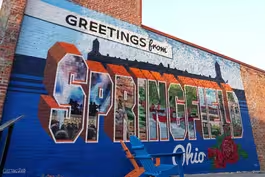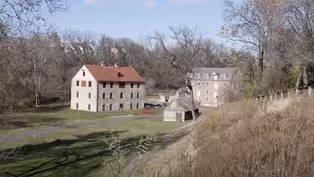
Northern Israel residents hesitant about returning home
Clip: 12/25/2024 | 5m 7sVideo has Closed Captions
Why Northern Israel residents are hesitant about returning home after 14 months of war
The ceasefire between Israel and Hezbollah has brought relative calm in northern Israel, but the road to recovery is long. Tens of thousands have been displaced due to Hezbollah’s rocket attacks. Producer Karl Bostic traveled to Metula and Kiryat Shmona along the border with Lebanon to meet families who finally got to visit their homes after 14 months of war. Jeffery Brown has the story.
Problems playing video? | Closed Captioning Feedback
Problems playing video? | Closed Captioning Feedback
Major corporate funding for the PBS News Hour is provided by BDO, BNSF, Consumer Cellular, American Cruise Lines, and Raymond James. Funding for the PBS NewsHour Weekend is provided by...

Northern Israel residents hesitant about returning home
Clip: 12/25/2024 | 5m 7sVideo has Closed Captions
The ceasefire between Israel and Hezbollah has brought relative calm in northern Israel, but the road to recovery is long. Tens of thousands have been displaced due to Hezbollah’s rocket attacks. Producer Karl Bostic traveled to Metula and Kiryat Shmona along the border with Lebanon to meet families who finally got to visit their homes after 14 months of war. Jeffery Brown has the story.
Problems playing video? | Closed Captioning Feedback
How to Watch PBS News Hour
PBS News Hour is available to stream on pbs.org and the free PBS App, available on iPhone, Apple TV, Android TV, Android smartphones, Amazon Fire TV, Amazon Fire Tablet, Roku, Samsung Smart TV, and Vizio.
Providing Support for PBS.org
Learn Moreabout PBS online sponsorshipWILLIAM BRANGHAM: It has been a month since the cease-fire deal between Israel and Hezbollah in Lebanon has brought relative calm to Northern Israel, but the road to recovery is long.
Tens of thousands have been displaced due to Hezbollah's rocket attacks launched in October of last year.
"News Hour" producer Karl Bostic traveled to Metula and Kiryat Shmona in Northern Israel along the border with Lebanon to meet families who finally got to visit their homes destroyed by 14 months of war.
Jeffrey Brown has the story.
JEFFREY BROWN: Coming home with no roof over your head.
It's been 14 months since Michael and Edna (ph) Racine were here, displaced by the war that began in the north with Hezbollah, after Hamas attacked the south on October 7 of last year.
MICHAEL RACINE, Metula Resident: This was a small dining place.
The lunch was there.
This is the kitchen.
JEFFREY BROWN: There's a lot to do.
And volunteers from across Israel are pitching in.
But despite the costs of war and the danger, there was never a doubt they'd return.
MICHAEL RACINE: Never crossed my mind not to come back here.
How can you not come back here?
JEFFREY BROWN: It's their dream house in the town of Metula, with sweeping views of Israel's northern border with Lebanon, which overnight became one of the most dangerous places in Israel.
MICHAEL RACINE: So there is Syria, and all the rest all the way is Lebanon, and the rockets came from there.
JEFFREY BROWN: Communities along Israel's border became routine targets, as Hezbollah increasingly rained rockets and missile strikes starting on October 8 of last year.
Metula's population of just over 2,000 was ordered by the Israeli government to evacuate.
In all, more than 65,000 people have been displaced for the past 14 months.
Michael left with his family for Central Israel.
Their home was abandoned, and then, in less than a minute last April, destroyed.
MICHAEL RACINE: The mayor of the village called me to tell me that our house was gone.
Four anti-tank missiles, Kornet, they are called, Russian missiles, hit the house within one minute, one after the other.
JEFFREY BROWN: It's not an isolated story.
For Nofar Raz and her three daughters, their home away from home for more than a year has been a hotel in Tel Aviv.
They share a room, even the same bed, after being forced to evacuate Kiryat Shmona, Israel's largest town in the north.
The "News Hour"'s Nick Schifrin met Nofar in Tel Aviv in October.
NOFAR RAZ, Kiryat Shmona Resident (through translator): We felt like we were being kicked out of our own home.
And you come to a place where there is nothing.
I can't be in my home.
I can't be with my husband.
And my sister was drafted as well.
JEFFREY BROWN: Her husband, Shalev, was called up for active military duty the day after the October 7 Hamas attack.
He's back now, and they're together again for the first time in more than a year.
But driving home, returning to Kiryat Shmona, means continued uncertainty.
The cease-fire offers a visit, but, so far, that's all.
And it was an emotional moment for 10-year-old Ariel (ph), excitement followed by tears and joy.
"News Hour" producer Karl Bostic met them earlier this month.
KARL BOSTIC: Do they understand what happened?
NOFAR RAZ: Yes.
KARL BOSTIC: What do you tell them?
NOFAR RAZ: They have war and we cannot stay in our house.
It's very dangerous.
They understand.
JEFFREY BROWN: Before the cease-fire, Kiryat Shmona was hit more than 300 times.
As recently as September, a rocket strike just missed hitting Nofar and Shalev's house.
SHALEV RAZ, Kiryat Shmona Resident (through translator): Any day, it can ignite in this area.
My daughter could be playing over here and a rocket could fall on her.
They have destroyed 80 percent of the long range-bombs, but the short-range bombs, they still have a lot of them.
JEFFREY BROWN: Back in Metula, entry remains restricted.
And even the mayor is pessimistic about his town's future.
DAVID AZULAY, Mayor of Metula, Israel (through translator): We're in a state of euphoria, but after 60 days Hezbollah will come back and will be stronger and will hurt us even more.
KARL BOSTIC: You think most of them will come back?
What are they telling you?
DAVID AZULAY (through translator): Firstly, I tell them it's not safe to live here.
Don't come back even once, and I think that at least 40 percent of them won't come back.
JEFFREY BROWN: Both the Racine and Raz families told us they want to be among those who do return.
But much is needed first, ending the war, reconstruction, and building a lasting peace.
For the "PBS News Hour," I'm Jeffrey Brown.
Boston Ballet offers a new look for 'The Nutcracker'
Video has Closed Captions
Clip: 12/25/2024 | 6m 4s | Boston Ballet offers a new look for Christmas classic 'The Nutcracker' (6m 4s)
Newly discovered galaxy could offer clues on Milky Way
Video has Closed Captions
Clip: 12/25/2024 | 6m 43s | How a newly discovered galaxy could offer clues on how our Milky Way Galaxy formed (6m 43s)
PolitiFact's 'Lie of the Year' and impact on Ohio town
Video has Closed Captions
Clip: 12/25/2024 | 7m 2s | PolitiFact's 'Lie of the Year' and its impact on the Ohio town caught in the middle (7m 2s)
What makes Bethlehem's Moravian settlements so unique
Video has Closed Captions
Clip: 12/25/2024 | 4m 52s | What makes Bethlehem, Pennsylvania's Moravian settlement so unique (4m 52s)
Providing Support for PBS.org
Learn Moreabout PBS online sponsorship
- News and Public Affairs

FRONTLINE is investigative journalism that questions, explains and changes our world.

- News and Public Affairs

Amanpour and Company features conversations with leaders and decision makers.












Support for PBS provided by:
Major corporate funding for the PBS News Hour is provided by BDO, BNSF, Consumer Cellular, American Cruise Lines, and Raymond James. Funding for the PBS NewsHour Weekend is provided by...



